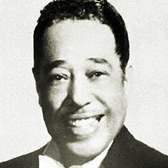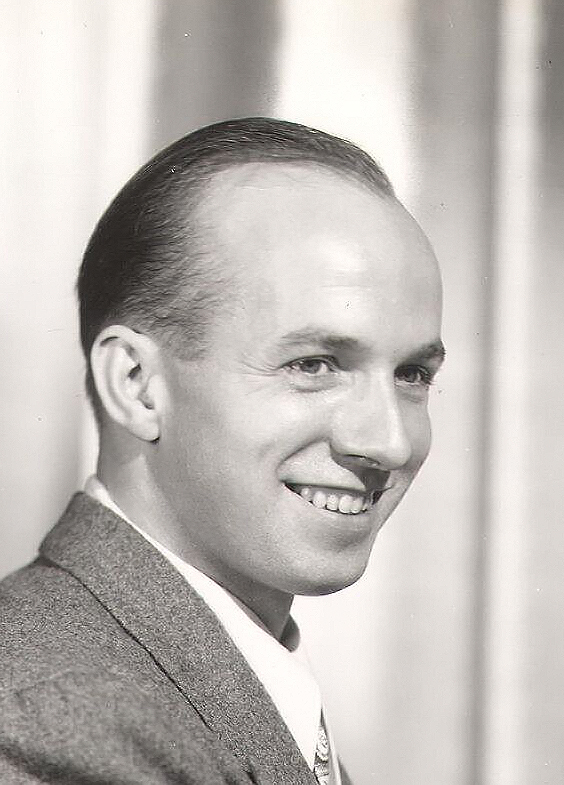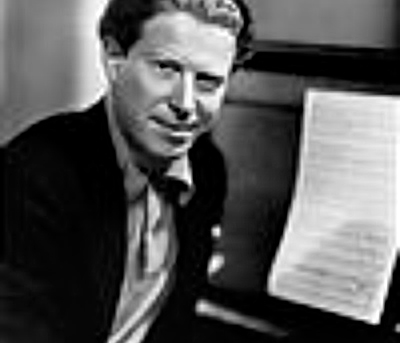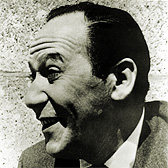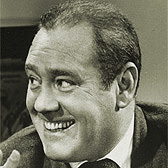
Lyricist and band leader in the 30s and 40s
Eddie De Lange
InducteeWrote the immortal "String of Pearls" and "Moon Glow"
At the zenith of his musical career in the 30s and 40s, Eddie DeLange was known for his dual success, both as lyric writer and as bandleader. In the opening years of the 30s, he became well known as the front man for one of the earliest bands associates with the swing era, the Hudson-DeLange Orchestra, a joint venture with composer/arranger, Will Hudson. In fact, among their very first collaborations was one of the most memorable songs of the day, "Moonglow".
During a three-year period of the mid-30s, the band played more than 200 ballroom dates throughout New England and the Midwest, and also appeared on various occasions in the Terrace Room of the old New Yorker Hotel, which later became one of the earliest showcases for the Benny Goodman Orchestra.
Born in Long Island, New York, in 1904 to a playwright/lyricist father and a mother who performed in Broadway musicals, DeLange attended the University of Pennsylvania, later taking graduate work in Hollywood's school of hard knocks as a bit player and stuntman. Lyric writing, however, had always been one of his obsessions, and while working in California, he continued honing his writing skills. In 1932, he returned to New York with over 100 lyrics in hand.
One of those song lyrics, "What Are Little Girls Made Of?" won him a contract with music publishing powerhouse, Irving Mills, for whom he spun out successful lyrics for what were to become some of the classic American standards. He put words to Duke Ellington's "Solitude," and wrote "Haunting Me," with Josef Myrow and "I Wish That I Were Twins," with Frank Loesser and Joseph Meyer. Between 1935 and 1938, the Hudson-DeLange band, its extensive tour schedules, recorded more than 50 songs for Brunswick Records, many of them composed by the two men fronting the orchestra.
The Hudson-DeLange partnership was finally dissolved in 1938, when Eddie DeLange formed and led his own orchestra on several tours. This band introduced and featured a new song, "At Your Beck and Call", a collaboration with Buck Ram, a young tunesmith who would one day find his own fame as manager of the 50s rock and roll vocal group, The Platters. The new DeLange Orchestra was also featured for a time on CBS Radio's "Dole Pineapple Show," behind comedian, Phil Harris and the Andrews Sisters.
During this period, a chance meeting with composer, Jimmy Van Heusen, resulted in a highly productive partnership which, in a relatively short time, produced such hit songs as "Deep in a Dream," "Heaven Can Wait," "Can I Help It?," "This is Madness," "All This and Heaven Too" and "Darn That Dream."
During one 41-week run between 1937 and 1939, there was at least one Eddie DeLange song at the top of radio's "Your Hit Parade," each week but one. During the earlier years of World War 11, he continued to turn out important hit tunes, among them, "Shake Down the Stars," "Just as Though You Were Here," "Velvet Moon" (the 1943 Harry James recording enjoyed enormous sales) and the immortal "String of Pearls."
Thereafter, motion pictures beckoned, and in 1944, DeLange and his wife, Marge, moved to Los Angeles, where he began another of his most productive career periods, writing songs for such movies as "The Bishop's Wife," with Cary Grant, David Niven and Loretta Young; "Captain from Castille," with Tyrone Power; "Lulu Belle," with Dorothy Lamour and George Montgomery; "If I'm Lucky," with Harry James, Perry Como and Carmen Miranda; "The Kissing Bandit," with Frank Sinatra and "Along the Navajo Trail" with Dick Charles and Larry Marks. For the 1946 movie, "New Orleans”, he collaborated with Louis Alter on the tune, "Do You Know What It Means to Miss New Orleans" a song now heard regularly as the theme for TVs "Frank's Place."
Eddie DeLange passed away in 1949 at the age of 45.


